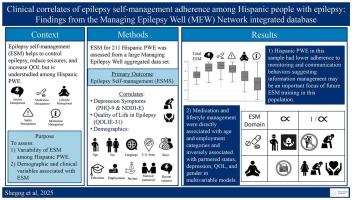Clinical correlates of epilepsy self-management adherence among Hispanic people with epilepsy: Findings from the managing epilepsy well (MEW) network integrated database
IF 2.3
3区 医学
Q2 BEHAVIORAL SCIENCES
引用次数: 0
Abstract
Background
Epilepsy self-management (ESM) by people living with epilepsy (PWE) can reduce seizure frequency and increase quality of life (QOL). ESM among Hispanic PWE is under-investigated and lacks adequate sampling and ESM assessment. The purpose of this study was to assess ESM and associated variables among Hispanic PWE using aggregate data from the Managing Epilepsy Well Network Integrated Database.
Methods
The sample comprised Hispanic PWE (n = 211) from nine ESM intervention studies that used common measures for socio-demographics, health status, prior 30- day seizures, depression (PHQ-9, NDDI-E), QOL (QOLIE-10), and ESM.
Results
The sample was 39.3 (±12.8) years, mostly female (56.1 %), preferring Spanish language (59 %), U.S. born (62.2 %), high school or college educated (35.7 %), single/partnered (43.9 %/41.0 %), employed/unemployed (33.0 %/32.1 %), with income <$25,000 (59.0 %), with depressive symptoms (35.1 %), and a seizure in the past month (52.5 %). Total ESM item mean scores were positively skewed (3.6 ± 0.4 on a 5-point scale). Medication, seizure, and safety management exceeded that for information and lifestyle management. In adjusted multivariable models, medication management was associated with age and employment (homemaker) and inversely associated with marital status (never married) and depression. Lifestyle management was associated with employment (unable to work) and inversely associated with sex (female), depression, and QOL.
Conclusion
Hispanic PWE were more competent in managing the medical aspects of their condition than lifestyle and informational issues. This study is significant because it leverages the analytic power of a large aggregate Hispanic PWE sample to describe ESM and can inform future study design, data collection, and tailoring of ESM interventions.

西班牙裔癫痫患者癫痫自我管理依从性的临床相关性:来自癫痫管理良好(MEW)网络综合数据库的发现
背景癫痫患者的癫痫自我管理(ESM)可以减少癫痫发作频率,提高生活质量(QOL)。西班牙裔PWE的ESM调查不足,缺乏足够的抽样和ESM评估。本研究的目的是利用管理癫痫井网络综合数据库的汇总数据,评估西班牙裔PWE的ESM和相关变量。方法样本包括来自9项ESM干预研究的西班牙裔PWE (n = 211),这些研究使用了社会人口统计学、健康状况、30天前癫痫发作、抑郁(PHQ-9, NDDI-E)、生活质量(QOLIE-10)和ESM的共同测量指标。结果样本年龄为39.3(±12.8)岁,以女性为主(56.1%),偏好西班牙语(59%),在美国出生(62.2%),高中或大学学历(35.7%),单身/有伴侣(43.9% / 41.0%),有工作/失业(33.0% / 32.1%),收入为2.5万美元(59.0%),有抑郁症状(35.1%),近一个月有癫痫发作(52.5%)。总体ESM项目平均得分正偏斜(在5分制中为3.6±0.4)。药物、癫痫和安全管理超过了信息和生活方式管理。在调整后的多变量模型中,药物管理与年龄和就业(家庭主妇)相关,与婚姻状况(未婚)和抑郁呈负相关。生活方式管理与就业(无法工作)相关,与性别(女性)、抑郁和生活质量呈负相关。结论西班牙裔PWE在医疗方面的管理能力强于生活方式和信息问题。这项研究具有重要意义,因为它利用了大量西班牙裔PWE样本的分析能力来描述ESM,并可以为未来的研究设计、数据收集和ESM干预措施的定制提供信息。
本文章由计算机程序翻译,如有差异,请以英文原文为准。
求助全文
约1分钟内获得全文
求助全文
来源期刊

Epilepsy & Behavior
医学-行为科学
CiteScore
5.40
自引率
15.40%
发文量
385
审稿时长
43 days
期刊介绍:
Epilepsy & Behavior is the fastest-growing international journal uniquely devoted to the rapid dissemination of the most current information available on the behavioral aspects of seizures and epilepsy.
Epilepsy & Behavior presents original peer-reviewed articles based on laboratory and clinical research. Topics are drawn from a variety of fields, including clinical neurology, neurosurgery, neuropsychiatry, neuropsychology, neurophysiology, neuropharmacology, and neuroimaging.
From September 2012 Epilepsy & Behavior stopped accepting Case Reports for publication in the journal. From this date authors who submit to Epilepsy & Behavior will be offered a transfer or asked to resubmit their Case Reports to its new sister journal, Epilepsy & Behavior Case Reports.
 求助内容:
求助内容: 应助结果提醒方式:
应助结果提醒方式:


